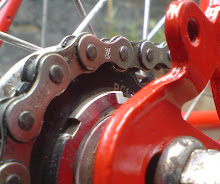Britain has fascists elected to the European Parliament. It's sickening and sad. The racism is inexcusable. For whatever reason, nearly one million people put a cross in the box in favour of the neo-Nazis.
But I didn't vote for them. I didn't vote at all, and even if I lived in the North West or Yorkshire and the Humber constituencies, I wouldn't feel guilty.
I don't and won't feel guilty because I didn't vote out of principle and conviction. The election of BNP representatives is incidental in sticking to my principles. That doesn't make it any less sad but it doesn't make it more my concern.
The principle is that devolution should be maximised and my belief is that achieving such devolution cannot be achieved via overcentralised governance bodies. I've stated these principles, why I believe them and why they matter in previous blog entries, but some things are worth re-stating.
For one thing, it is a fallacy that the way to deal with globalising corporations is to globalise democracy. If anything, local communities being able to keep posession of its own resources and set conditions for external businesses is the only way that they can keep control of their lives. Even more importantly, a fragmented economy can only be more stable than a globalised one: like leaves of grass are more resilient in a storm than a single exposed tree.
In recent times there have been positive changes and initiatives, supported by central government, such as Agenda 21 and the Sustainable Communities Act, but the overwhelming tendency has been to liberalise markets and agree to more consolidated power and decision-making. How else could it be when power comes with money, and corporations and corporate lobby groups continually stay richer than elected governments?
I assert that the ideal distribution of power is a pyramid, with local communities at the bottom and the United Nations at the top. The current power distribution, with nations of various sizes wielding most power and a mish-mash of supra- and sub-national bodies taking a lesser share, is therefore wrong, but also impossible to dismantle from within.
In practical terms, I can't see how voting will lead to signficiant devolution. What's more, without the ability to change power distribution, the large regional, national and supra-national bodies are illegitimate. If a body, elected or not, is illegitimate, it doesn't matter how it is populated, or by whom.
As I've admitted before, the most difficult historic situation to face as a pacificist and anarchist would have been the rise of Nazism in the 1930s. So what happens when Nazis or neo-Nazis gain control of national parliament? The parliament is no less legitimate and the right to disobey becomes even clearer.
If anything, my conviction will only get stronger if the BNP continues to gain ground. I will not be intimidated by the politics of hatred, but neither will I be scared into voting against them.
Subscribe to:
Post Comments (Atom)


No comments:
Post a Comment